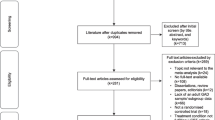Abstract
This paper presents data on a patient evaluation of a group cognitive behavioural therapy programme in an applied setting and its efficacy for reducing generalised anxiety and or depression, and distress. Patients (n = 14) participated in one of two 8-week group cognitive behavioural therapy programmes for generalised anxiety or depression, within a mental health service. Patients’ perceptions of the programme were collected via an evaluation questionnaire, and data on clinical outcomes were sourced from patients’ case notes. Most patients who were invited to participate in the programme (n = 14 of 17), and their evaluations were generally favourable. Almost all participants (93%) indicated that the programme either met or exceeded their expectations. The clinical outcomes of the intervention were similar to those found in efficacy studies reported in the published literature (approximately half to threequarters of one standard deviation improvement in anxiety, depression, and distress scores).
Similar content being viewed by others
References
Butler, A. C., Chapman, J. E., Forman, E. M., & Beck, A. T. (2006). The empirical status of cognitive-behavioral therapy: A review of meta-analyses. Clinical Psychology Review, 26, 17–31.
Chambless, D. L., & Hollon, S. D. (1998). Defining empirically supported therapies. Journal of Consulting and Clinical Psychology, 66, 7–18.
Goldfried, M. R., & Wolfe, B. E. (1998). Toward a more clinically valid approach to therapy research. Journal of Consulting and Clinical Psychology, 66, 143–150.
Hofmann, S. G., & Smits, J. A. J. (2008). Cognitive-behavioral therapy for adult anxiety disorders: A meta-analysis of randomized placebo-controlled trials. Journal of Clinical Psychiatry, 69, 621–632.
Kessler, R. C., Andrews, G., Colpe, L. J., Hiripi, E., Mroczek, D. K., Normand, S.-L. T., et al. (2002). Short screening scales to monitor population prevalences and trends in non-specific psychological distress. Psychological Medicine, 32, 959–976.
Lawrence, R., Bradshaw, T., & Mairs, H. (2006). Group cognitive behavioural therapy for schizophrenia: A systematic review of the literature. Journal of Psychiatric and Mental Health Nursing, 13, 673–681.
Lockwood, C., Page, T., & Conroy-Hiller, T. (2004). Comparing the effectiveness of cognitive behaviour therapy using individual or group therapy in the treatment of depression. International Journal of Evidence-Based Healthcare, 2, 185–206.
Lovibond, P. F., & Lovibond, S. H. (1995a). The structure of negative emotional states: Comparison of the depression anxiety stress scales (DASS) with the Beck depression and anxiety inventories. Behaviour Research and Therapy, 33, 335–343.
Lovibond, S. H., & Lovibond, P. F. (1995b). Manual for the depression anxiety stress scales (2nd ed.). Sydney, Australia: Psychology Foundation.
Matsunaga, M., Okamoto, Y., Suzuki, S., Kinoshita, A., Yoshimura, S., Yoshino, A., et al. (2010). Psychosocial functioning in patients with treatment-resistant depression after group cognitive behavioral therapy. BMC Psychiatry, 10(22), 258–265.
Petrocelli, J. V. (2002). Effectiveness of group cognitive-behavioral therapy for general symptomatology: A meta-analysis. Journal for Specialists in Group Work, 27, 92–115.
Stewart, R. E., & Chambless, D. L. (2009). Cognitive-behavioral therapy for adult anxiety disorders in clinical practice: A meta-analysis of effectiveness studies. [Article]. Journal of Consulting and Clinical Psychology, 77(4), 595–606. doi:10.1037/a0016032.
van Ingen, D. J., & Novicki, D. J. (2009). An effectiveness study of group therapy for anxiety disorders. International Journal of Group Psychotherapy, 59, 243–251.
Victorian Government Department of Human Services. (2002). Victorian population health survey 2001: Selected findings. Melbourne, Australia: Rural and Regional Health and Aged Care Services Division.
Acknowledgments
The authors would like to thank the patients whose data was used in this study. No funding was sourced to support this project. The authors alone are responsible for the content and writing of the paper.
Author information
Authors and Affiliations
Corresponding author
Rights and permissions
About this article
Cite this article
Naik, A., O’Brien, A.P., Gaskin, C.J. et al. The Acceptability and Efficacy of a Group Cognitive Behavioural Therapy Programme in a Community Mental Health Setting. Community Ment Health J 49, 368–372 (2013). https://doi.org/10.1007/s10597-012-9484-3
Received:
Accepted:
Published:
Issue Date:
DOI: https://doi.org/10.1007/s10597-012-9484-3




